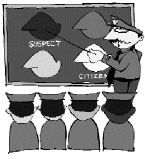Empirical data suggests it will happen tomorrow, too. But if it were left to some politicians, taxpayers would be funding some new studies, and some well-qualified consultants, to examine just exactly why the sun keeps coming up, and whether it will continue to do so in the future.
Similarly, Seattle’s brain trust wants to study racial profiling, the police practice of initiating investigations of people based on their race. Duh. We know it’s a problem. But rather than attempt to actually stop this venal practice, we get politicians spewing hot air about what an unfortunate thing it is, if they admit it happens at all.
This week, the Seattle City Council voted on a nonbinding Jim Compton resolution condemning racial profiling, calling for more study, and calling for the Seattle Police Department to stop it. This is fine and well; a resolution is better than silence, which is what we’ve had for decades. But the problem with the resolution is nicely summarized by one of its “whereas” segments: “Whereas, the reasons for [higher rates of ticketing among African Americans in Seattle] are poorly understood. . . .”
Maybe white folks don’t understand. Ask any black person. They understand. It’s called racism—a word polite Seattle shies away from and one that should not be used lightly.
In this case, no other word will do. Too many whites take this as an accusation, but it’s not; it’s simply a statement of fact. One need not have hooded bigots careening through the streets of Seattle in squad cars to have institutionalized racism, and hence racial profiling. We can, and do, have institutional racism—that is, a systematic discrimination against minorities because of the color of their skin—in a city brimming with well-meaning liberals professing their broadmindedness. The problem is not the bigotry of individuals, although as with anywhere else Seattle—and the Seattle Police Department—has its proportionate share of bigots. The problem is the results of the system.
The system, in this case, results in officers deciding to stop African Americans, and particularly young African-American men, for pretexts that would be insufficient grounds for stopping a white person. The reasons may vary: The car looks new and the suspect shouldn’t be able to afford a new car (read: deals drugs). The car looks old and therefore shouldn’t be on the road (find a safety violation). The suspect looks nervous. (Wouldn’t you be?) The suspect is a suspect, not simply another citizen, because he is black.
The inside view
I had a fascinating conversation last week with a veteran SPD officer who wished to remain anonymous for obvious reasons. The officer blasted the department for the racism and sexism of many of its men—and women. The SPD member cited example after example of officers hounded by colleagues, passed over for promotions, and excluded from the Old Boy Network because of skin color or gender: “The mood for women and minorities is a nightmare here.” The officer criticized former police chief Norm Stamper in particular for looking the other way when presented with cases of internal racism and for failing to set up an internal relations committee to deal with problems among officers. The cop told of celebrations when I-200 passed. The officer made the astounding claim—impossible to verify—that no SPD officer had ever been demoted or fired for sexual harassment.
If this is how many SPD officers treat their colleagues, how can they be expected to treat ordinary citizens? How many more studies do we need? Racial profiling studies are useless. For one thing, we already have enough data. For another, when officers know data is being compiled, there is nothing to stop them from lying—omitting stops or changing the race of the driver (there is, after all, no other data beyond a license plate).
Instead, we need cameras in squad cars. Film doesn’t lie. It also captures the intangibles: the demeanor of the officer, the actual offense (real or imagined) that is the pretext for the stop. Cameras are also safety tools for officers. And SPD needs department-wide racism sensitivity training. Such training may not change years of ingrained behavior, but it sends a message far more concrete than City Council resolutions or a speech from a new chief.
Particularly in the wake of the David Walker shootings, distrust of SPD among minorities in Seattle is endemic. It is not a time for symbolic gestures or meetings with a few community leaders. SPD needs to institute a systematic method for tracking racial profiling, with dire consequences for officers, white or black, who engage in it. Nothing less will do.
Voters bored to death
Red Cross relief workers and other disaster agency volunteers filed early reports from the scene of the carnage suggesting that millions of Washington state voters may have died early this week in an unusual case of politician-induced torpor. The deaths came after voters had been trapped for weeks under a sea of pointless campaign rhetoric and lawn signs.
Initial reports suggested that some survivors had tapped on the hull of their constructed obliviousness in a surprised and desperate plea for help, but officials are now saying the voters are likely to have died instantly following the impact of this year’s voters pamphlet.
Governor Gary Locke flew over the scene early today, commenting, “Don’t I have a lovely family?” Other officials, many of whom bear responsibility for the deaths, scrambled in the wake of the tragedy to fix blame elsewhere—on people who didn’t vote and therefore “had no right to complain” or on voters who got all of their information from television or, worse, the Internet.
The immediate cause of death, however, appears unquestionably to have been the infusion of corporate cash that resulted in all major political candidates bearing essentially the same probusiness, antihuman message. As a result, democracy suffocated.







